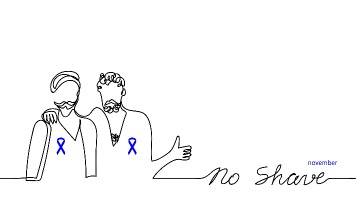Movember: Speaking Up for Men’s Health

You’ve probably heard of No-Shave November, when men around the world grow out their beards and mustaches. But the trend is more than just a fashion statement! November (or Movember) is Men’s Health Month, a period dedicated to raising awareness and funds to address critical men’s health issues, such as prostate cancer, testicular cancer, and depression.
The Movember campaign was born in Australia in 2004 when a group of friends decided to forego shaving for a month to raise awareness about prostate cancer and depression in men. In 2007, the No-Shave November campaign was started by a Chicago family after their father passed away from colorectal cancer. Participants in No-Shave November give up shaving and grooming their facial and/or body hair for 30 days. Then, they donate the money they save on haircare and supplies toward cancer research. Between 2009 and 2019, the No-Shave November campaign has raised over $10 million dollars!
A critical piece of both Movember campaigns is increasing education about men’s health issues. So here are some important facts to keep in mind this Men’s Health Month.
Men’s Physical Health
Prostate cancer is the second most common cancer among American men after skin cancer. In 2022 alone, there were over 260,000 new cases of prostate cancer diagnosed in the United States. Cons, around 34,500 men died from the disease.
Approximately 1 in 8 men will be diagnosed with prostate cancer in their lifetime. The disease is more likely in men over 65 and in non-Hispanic Black men. While prostate cancer is a very serious disease, it is also very survivable if caught early. The American Cancer Society recommends that men over 50 at average risk, men over 45 at high risk (including Black men and any men with a first-degree relative who was diagnosed with prostate cancer at an early age), and men over 40 at highest risk (those with more than one first-degree relative with prostate cancer at an early age) talk to their doctor about getting screened.
While less common, testicular cancer also poses a concern for men. In 2022, there were almost 10,000 new cases of testicular cancer diagnosed in the United States, and around 460 men died from the disease. The average age of diagnosis is 33. Testicular cancer is a more common disease than prostate cancer among young and middle-aged men.
As with prostate cancer, testicular cancer is highly treatable if diagnosed early. While there is no official recommendation screening process, testicular exams should be part of men’s annual physicals. In addition, some doctors recommend regular self-exams. Any lumps or abnormalities should go through a doctor’s assessment right away.
Men’s Mental Health
Clearly, diseases like prostate and testicular cancer negatively impact thousands of men, and their friends and families, every year. However, mental illness poses an even larger threat to men’s health but receives very little attention in comparison with these physical diseases.
Over 6 million men in America experience depression every year, and an estimated 14 percent of American men suffer from some type of anxiety disorder. Men are also less likely to seek treatment for mental illnesses. As a consequence, the suicide rate among American men is four times higher than among women.
The reason for this, many experts believe, is twofold. First, depression and anxiety often take different forms in men than they do in women. Therefore, there isn’t a quick diagnosis. Women suffering from depression often cite symptoms like feelings of extreme sadness or worthlessness. Men are more likely to experience fatigue, aggression, irritability, and loss of interest in work or hobbies.
Second, many men do not seek treatment for mental illness due to lingering stigma and fear of seeming weak or unmanly. Men, and their friends and family who may not recognize the signs of depression, may believe that they should be able to push through their problems on their own. They may also have trouble being emotionally vulnerable and reaching out for help.
But mental health issues are no cause for shame! They are often just part of being human. As the statistics show, issues like depression and anxiety are extremely common and do not reflect any kind of character flaw or weakness. They are illnesses like any other; the only difference is that the organ they impact is the brain, rather than the heart, lungs, or liver. So, if you or a man you love are exhibiting signs of depression or anxiety, there is help! Your EAP offers a range of mental health resources to help.
This Movember, let’s end the stigma and normalize the conversation about men’s mental health!

